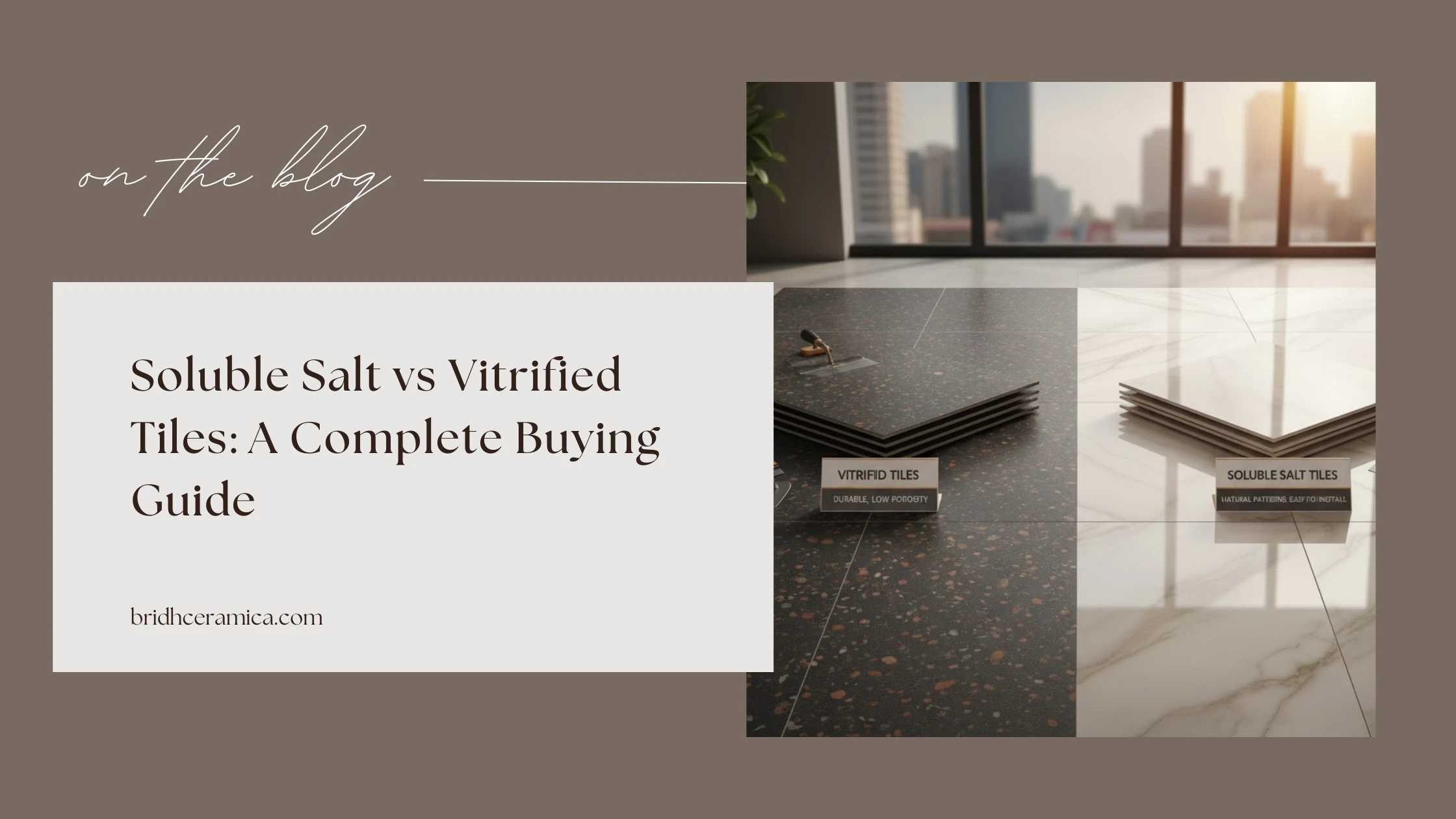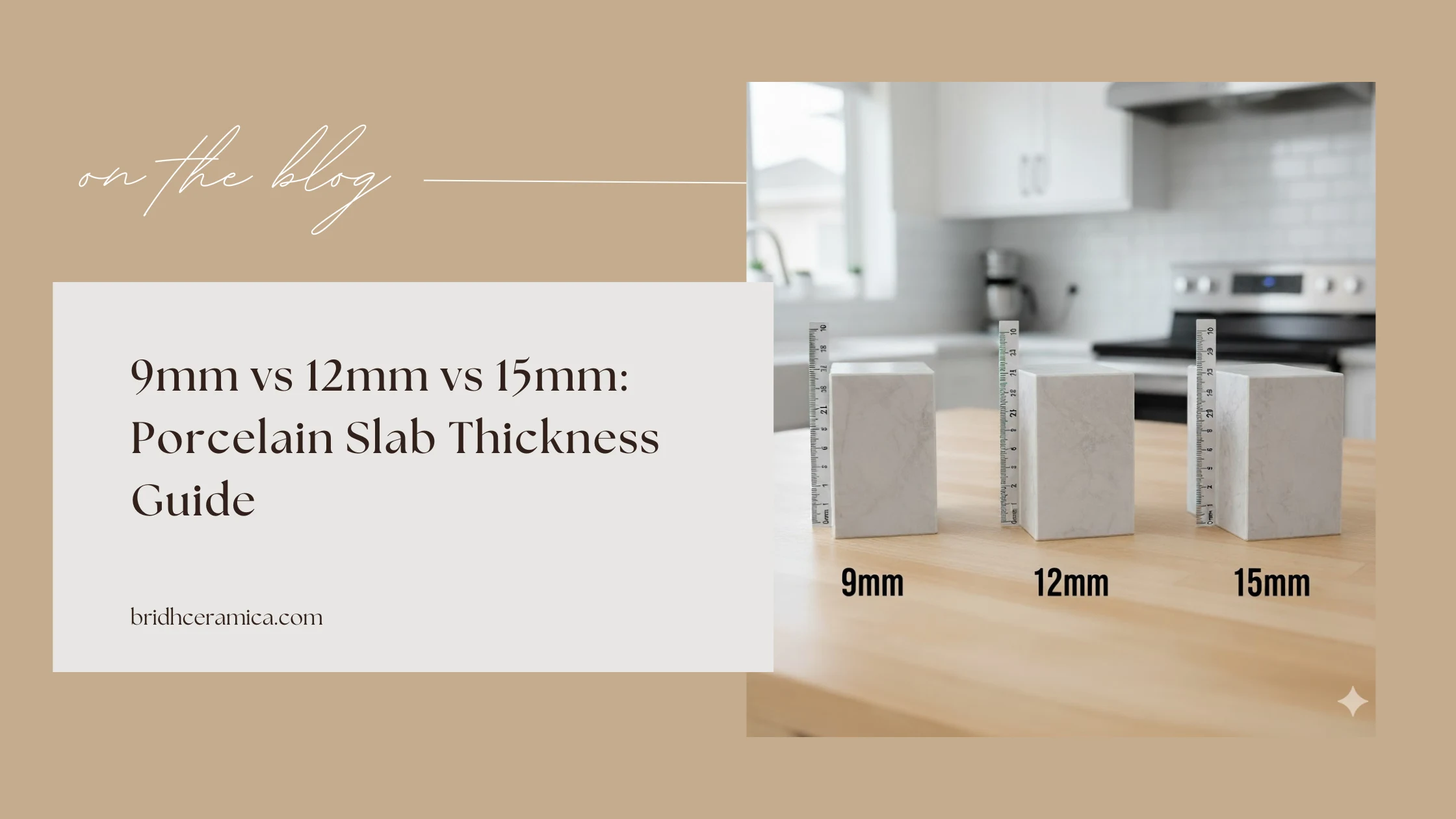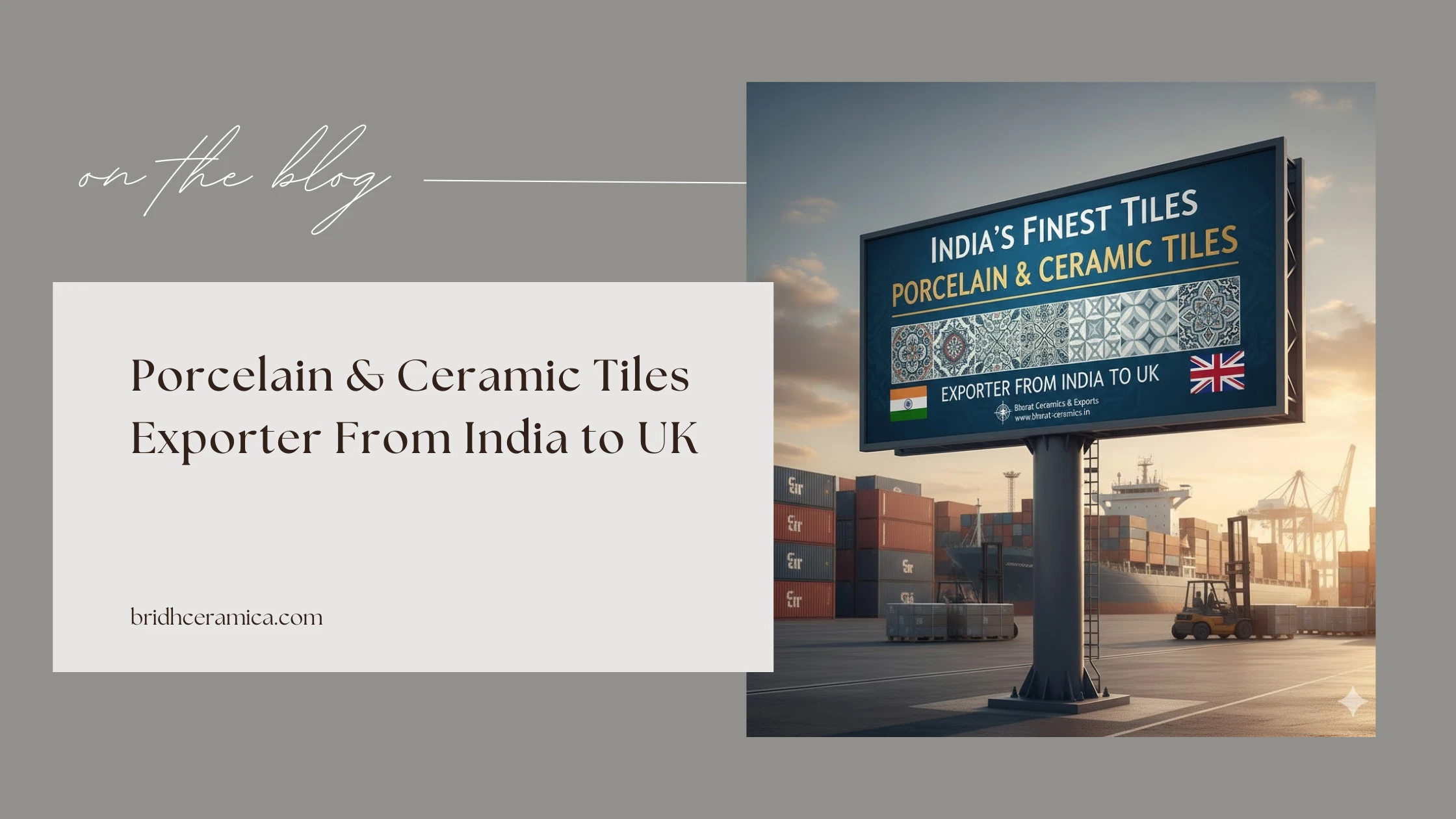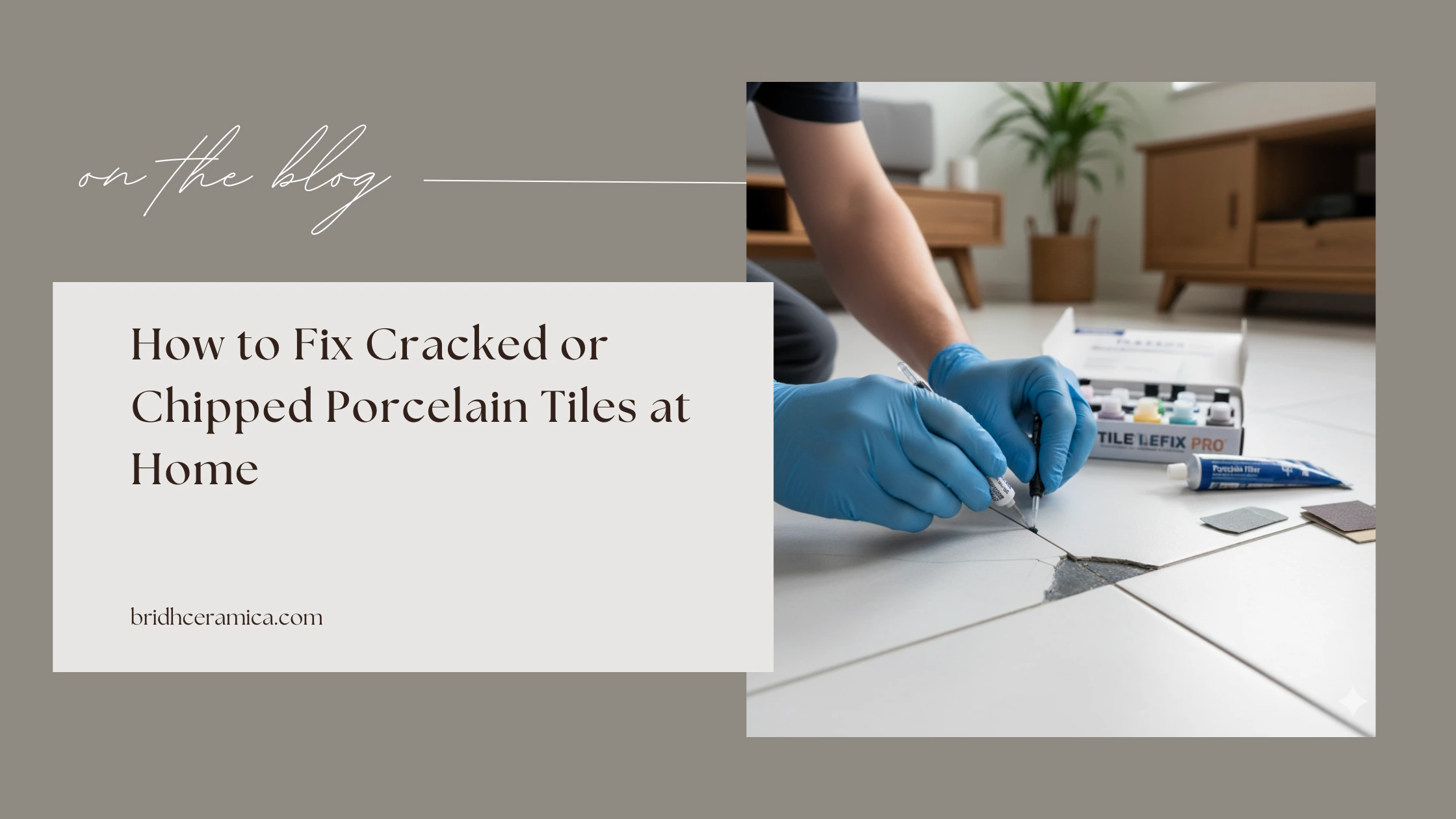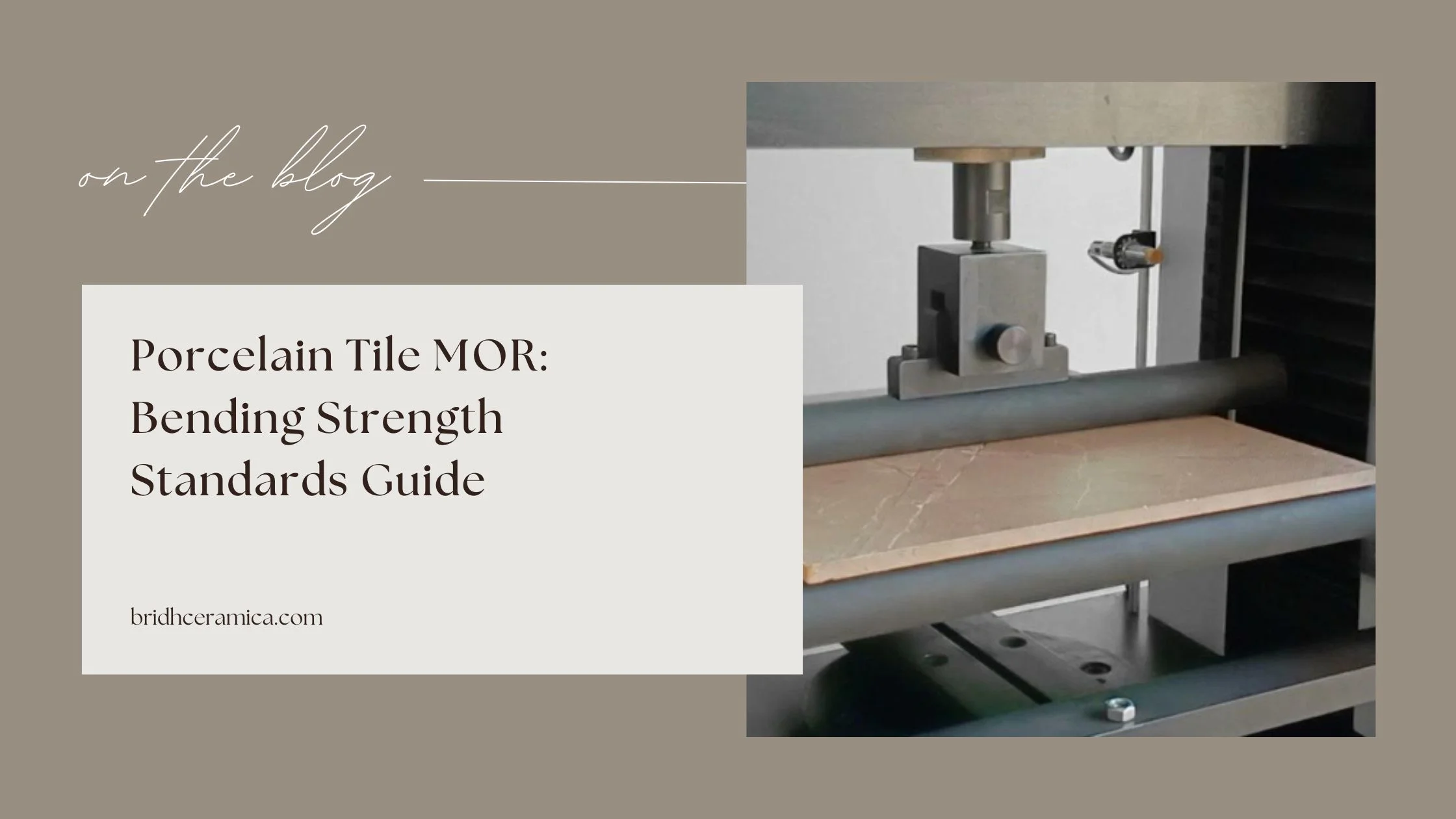Soluble Salt vs Vitrified Tiles: A Complete Buying Guide
Nov 10, 2025Connect With Our Team
Introduction: Understanding the Strength Behind Porcelain Tiles
Porcelain tiles are widely regarded for their exceptional durability, low porosity, and timeless visual appeal, making them a top choice for both residential and commercial interior and exterior applications. Porcelain tiles are known for many superiorities over their ceramic counterparts, one of which is their resistance to breaking and high load capacity. In this article, we will briefly try to cover topics like what the bending strength and/or MOR of the porcelain tile as well as how the tiles are tested to check the breaking strength practically at the laboratory or manufacturing facilities.
However, what truly sets porcelain tiles apart is their ability to withstand mechanical stress without cracking or breaking, a property measured by their bending strength, also known as Modulus of Rupture (MOR). Whether you are an architect seeking high-performance flooring materials or a homeowner looking for tiles that endure daily wear and tear, understanding MOR can help you make informed decisions and ensure long-lasting tile installations.
What is Bending Strength Or Modulus of Rupture (MOR)?
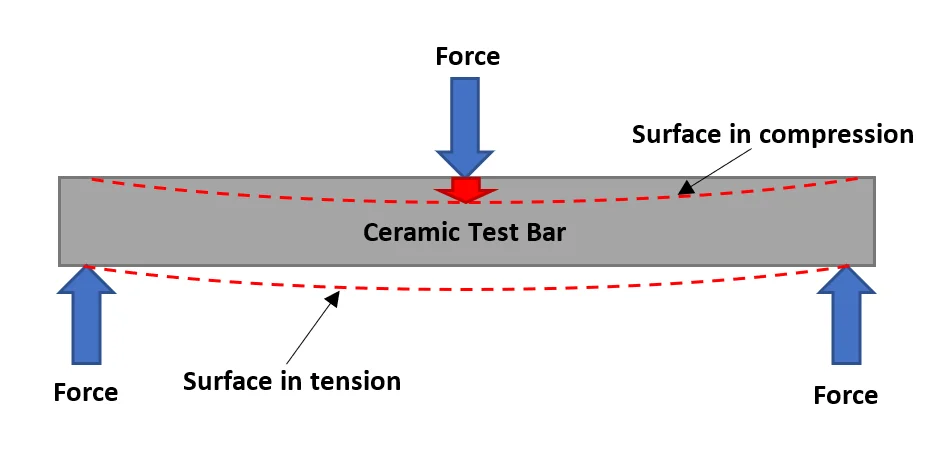
Bending Strength, also known as Modulus of Rupture (MOR), is a very important mechanical property that measures the maximum tensile stress any tile is capable of resisting when loaded to the point before finally fracturing. In simpler words, MOR specifies the amount of force that a tile may withstand and still crack when something exerts pressure on it, wherever on its surface.
It is significant particularly in the case of flooring tiles which need to support not just the weight of people but also heavy furniture, rolling equipment as well as by chance collisions. The more the MOR value, the more resistant to bending or breaking, and thus the improvement of the overall structure reliability during the installation of the tile.
We need to define a few parameters to learn about these :
1. Breaking Load: The amount of force required to break a tile, which is defined in Newtons (N).
2. Breaking Strength: Force derived by multiplying the Breaking load by the ratio of the measurement between the rollers (used to test the breaking load) and the width of the tile.
3. Bending Strength or MOR (Modulus of Rupture): The measurement in N/mm2 obtained by dividing the Breaking Strength by the ratio.
How is the MOR Of Porcelain Tile Measured?
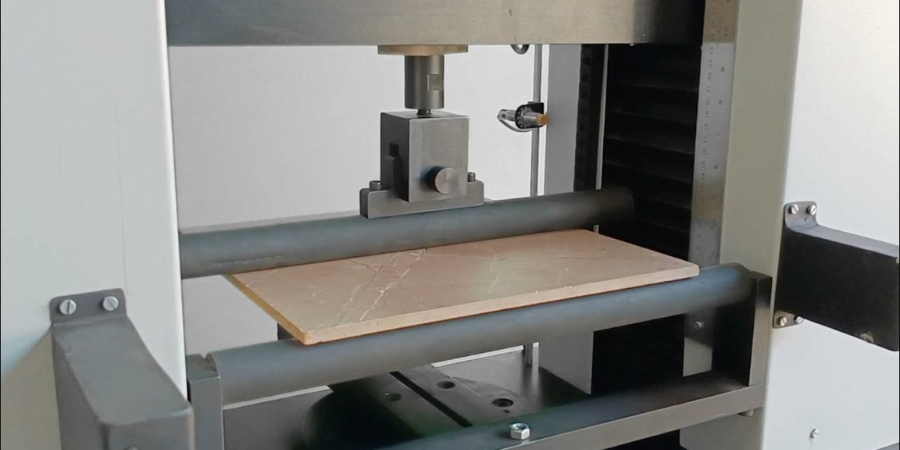
The Modulus of Rupture (MOR) of porcelain tiles is determined through standardized testing methods prescribed by international norms such as ISO 10545-4 (globally recognized) or ASTM C648 (commonly used in the USA). During this test:
-
A porcelain tile sample is positioned horizontally on two support rollers set at a specific distance apart.
-
A controlled, steadily increasing force is applied precisely at the center of the tile using a loading roller until the tile fractures.
-
The maximum breaking force is recorded, and the MOR value is calculated using the formula:
MOR (MPa)= 3FL /2bd2
Where:
-
F = The maximum force applied at breakage (in Newtons)
-
L = The span (distance) between support rollers (in millimeters)
-
b = The width of the tile sample (in millimeters)
-
d = The thickness of the tile sample (in millimeters)
This is the calculated capacity indicating the ability of tile under pressure not to bend, and this useful information is used in the classification of strengths of tiles.
In every one of our porcelain tiles manufacturing units, we have a laboratory which does the checking of the raw material on all parameters, one of which is the MOR test. In the lab we have equipment to verify the Bending strength to test a small chunk of the tile. Such a tile ought to go through the test in order to continue with the raw material to manufacture the physical tile.
In the process of making the porcelain tile, we need to measure the MOR using the larger variant of the laboratory gear. In this case, the actual tile used in the production is verified on the parameter of MOR value over a time range of one hour in intervals, and on each and every batch of the specific production, the same records are recorded in the quality control reports.
It is placed between the rollers in the machine used in testing, and then the strength of the tile is tested by the machine until it breaks. This machine provides us with the value of bending strength. There is a chance that some of the machines are calculating on different formulae or units, and as such, we will have to convert them to give them in N/mm2.
It is this way that the porcelain tiles are tested on the MOR, or the bending strength of the tile. Typically, according to the international standards of tile: EN 14411 - ISO 10545-4, the bending strength in the porcelain tile ought to surpass 35 N/mm2 in case of the pressed tiles.
For comparison:
-
Wood: ~50 N/mm²
-
Standard concrete: 50–200 N/mm² (for ultra-high strength concrete)
The relatively high MOR of porcelain tiles means they can withstand significant bending forces before breaking, making them ideal for high-traffic areas, commercial flooring, and heavy-duty applications where durability is paramount.
Standard MOR Values For Porcelain Tiles
There are some minimum MOR values agreed to by international tile standards according to the need of quality products and the safety of use:
1. ISO 10545-4 Requirement of Porcelain Tiles:
At least 35 N/mm2 (or MPa) MOR makes unglazed porcelain tiles useful in heavy loading areas like the skill at the airport, shopping malls and factories.
Glazed porcelain tiles have a minimum MOR of 32 N/mm2 to give strength balanced with good appearance of the surface finishing.
2. MOR normal in good-quality tiles:
MOR range in porcelain tiles of superior quality manufactured by well-established firms would be between 35-50 MPa, based on which process it has been made, the quality of raw materials, tile size, and the application.
Tiles of greater MOR values are fine to use in a high traffic or industrial area and moderate ones in residential drywall and low impact areas as well as residential wall tiles.
Why is MOR Important For Tile Selection?
Understanding and considering MOR values during tile selection is crucial for ensuring tile performance, durability, and safety:
1. Floor vs Wall Tiles: Floor tiles are the ones on the floor as opposed to wall tiles that are on the walls. The MOR value is extremely more in the case of floor tiles because it has to take the design loads directly, like the foot traffic, dropped objects, or furniture pressure, etc. Wall tiles, on the other hand, have predominantly static loads imposed on them.
2. Heavy Traffic Areas: The porcelain tiles specifically required in commercial settings like airports, malls, and office lobbies have to have high MOR values to avoid wear and tear, cracking, and deformation due to the constant movement of heavy traffic and rolling trolleys.
3. Outdoor Installations: Outdoor porcelain tiles should be able to resist high amounts of bending strength and endure environmental pressures such as freeze-thaw, thermal expansion, and unintentional outdoor equipment or falling objects. By properly choosing the value of MOR of the tiles, it is possible to avoid premature failures, cracks, or replacement before reaching a long life of tiles, which is economical in the long-term use.
Selecting tiles with appropriate MOR values prevents premature failures, cracks, or replacements, ensuring cost-effective, long-term performance.
Factors Affecting the Bending Strength Of Porcelain Tiles
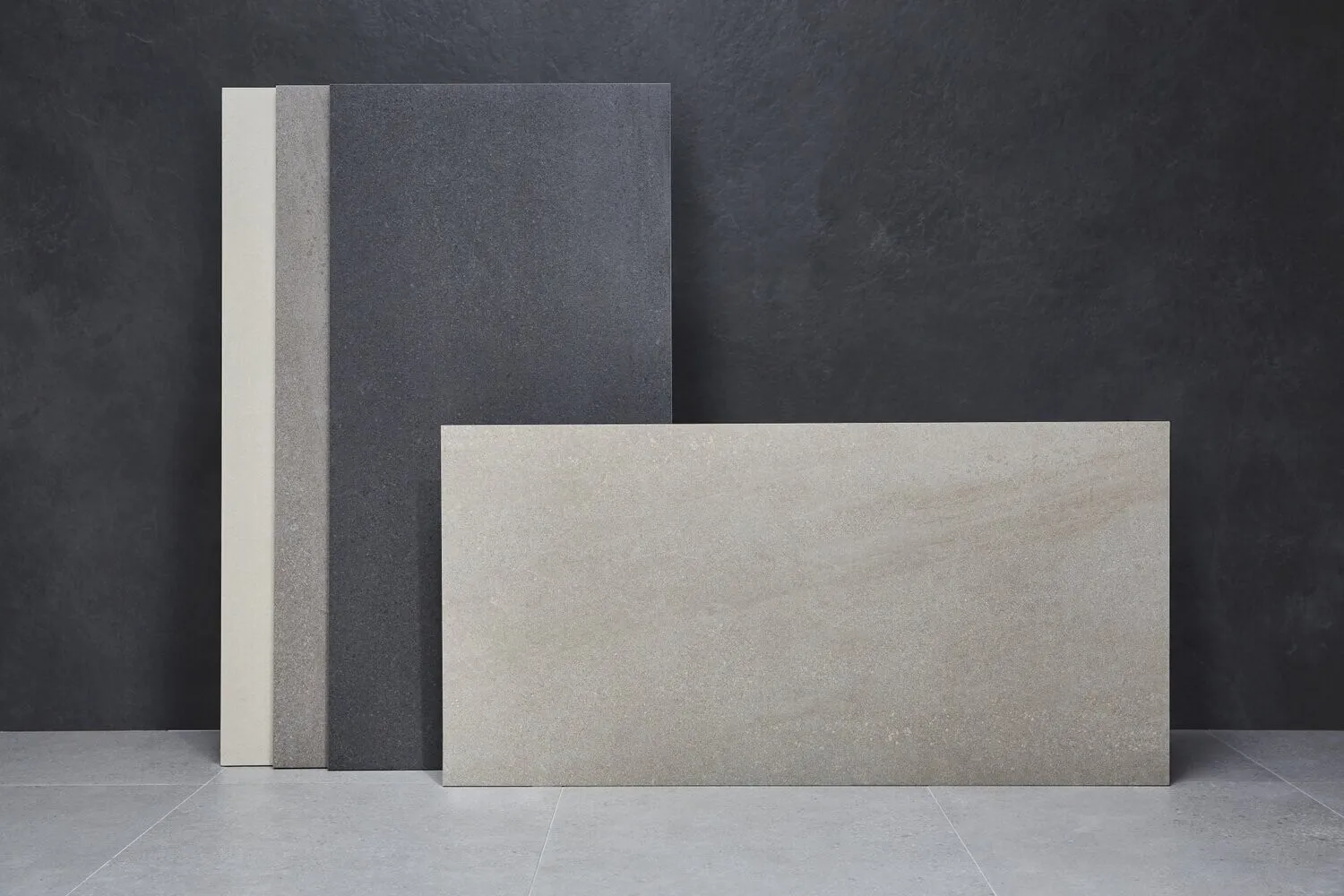
Several factors influence the Modulus of Rupture (MOR) in porcelain tiles, directly impacting their mechanical strength and application suitability:
-
Tile Thickness
Thicker porcelain tiles have a higher MOR value because they provide additional material mass that will counter the tendency to bend due to stress exerted on the floor, suitable for heavy-duty floors.
-
Firing Temperature and Duration
When the tile has been fired in a proper kiln at high temperatures (normally 1200-1300 °C), its body is vitrified, making it dense, hard and strong with high MOR.
-
Raw Material Composition
Raw materials with higher quality and the ratio of fine clay, feldspar, quartz, and kaolin will influence the microstructure of the tile, hence their mechanical properties, such as bending strength.
-
Surface Treatment and Glazing
Unglazed tiles are prone to slightly elevated MOR values because the dense body of this kind of tile is more likely to endow the tile with improved mechanical power, and glazed tiles could bear even slightly reduced MOR values because of the extra layer of coating the tile has.
How to Check MOR Before Purchase?
When you are a responsible buyer, a builder, and an architect, never compromise on the technical datasheet or a document of certification of the tile made by the manufacturer or the supplier. Established tile brands openly report the MOR values alongside other technical details of their products, including water absorption, abrasion resistance, and chemical resistance values, so that you end up with a tile that best suits your purpose.
In case of doubts, inform the supplier or manufacturer to ensure that the tile conforms to the set standards that the international governing bodies specific to that particular line of work have given them.
Why Choose Bridh Ceramica For High-Strength Porcelain Tiles?
At Bridh Ceramica, we specialize in manufacturing and exporting premium porcelain tiles that not only meet but exceed international MOR standards such as ISO 10545-4. Our tiles undergo rigorous laboratory testing, quality control inspections, and are engineered to deliver superior strength, aesthetic excellence, and exceptional longevity. Whether you require high-strength tiles for industrial flooring or stylish tiles for residential interiors, our versatile product range ensures perfect solutions for every space.
Conclusion
Choosing porcelain tiles with appropriate Modulus of Rupture values is essential for guaranteeing the longevity, reliability, and cost-effectiveness of your flooring or wall installations. Whether you’re outfitting a residential bathroom, a commercial office, or an industrial workspace, tiles with tested and certified MOR ratings offer confidence against mechanical stress and accidental impacts. Always prioritize tiles from reputable manufacturers who comply with global quality and safety standards to ensure worry-free tile installations.
Whatsapp Chatx
Hi! Click one of our representatives below to chat on WhatsApp or send us email to dhaval@bridhceramica.com

|
************** +91 97023 82809 |
 TILES VIEW
TILES VIEW
